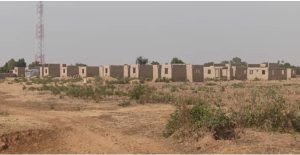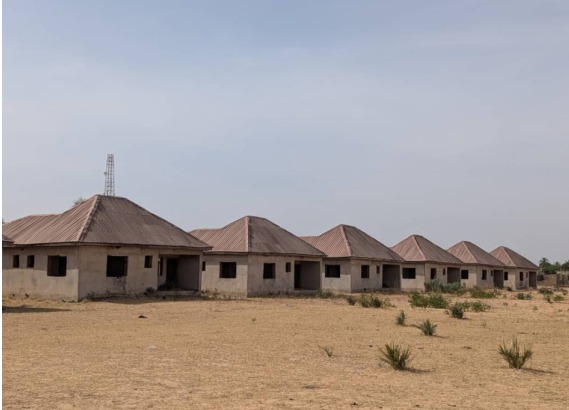Despite the 22 million units of housing deficit in Nigeria, over N9 trillion worth of building projects are tied down in abandonment, experts in the built environment have said.
Some of these projects lying waste across the states of the federation, experts said, were mostly abandoned housing projects initiated by the federal government’s ministries, departments, and agencies.
According to the experts, these abandoned housing projects are evident in states like Zamfara, Jigawa, Bauchi, Gombe Ogun and Lagos, among others.
In Lagos, for example, the abandoned and underutilized buildings cited by the experts included the old Federal Secretariat Complex in Ikoyi, the NETCOM Building at Marina, the 25-story Independence Building located in Onikan., and many other vacant federal government properties.
The experts blamed the dearth of funds, wrong location, absence of infrastructure, poor project planning/management, and lack of enforcement of planning laws, among others, for the huge building projects’ abandonment in the country.

Decrying the situation, a built environment expert, the managing director of Fame Oyster & Co., Mr. Olufemi Oyedele, said it was found out that over N9 trillion is tied down in abandoned and ongoing construction projects in Nigeria by the Nigerian Institution of Quantity Surveyors.
He pointed out that the economic waste in money tied down in construction that could not give value for money or was was not habitable was too much.
“We must do something to change the narratives,” he said.
To change the narratives, Oyedele urged the government to make laws against abandoned properties.
He urged the government to set up housing regulators that will ensure that all prospective homeowners get the backing of a mortgage or commercial bank before starting construction and make sure there is enforcement of the planning and national building codes.
According to him, the nation must evolve a standard gestation period for construction by ensuring that construction passes an assessment test.
Executive Director of the Housing Development Advocacy Network (HDAN), Mr. Festus Adebayo, said that the findings of the organization on the abandonment of the federal government’s initiated housing projects in Kebbi, Jigawa, Zamfara, Gombe, and Ogun States were discouraging.
He said, “We have been going from one state to another compiling the report on abandoned housing projects across the country; we have been working very hard, and I can tell you that from our findings, the situation is very discouraging.
“We cannot believe the level of abandoned housing projects in many parts of the country, and these are projects of the federal government.
“When I say federal government, I mean projects of various agencies of government that we will not want to mention the names of until during the time of making a proper presentation of our findings.

“We have been to Kebbi State; we have seen various housing projects of different categories, the one by the federal government and the one by the state government being abandoned. We have seen the one being developed by the federal government that is cited in the wrong location—I mean, the outskirts of the city—and the project hasn’t been completed.
“The miscreants have been going there to remove the roof, remove the doors, remove the windows; the same things we find in Zamfara and in Jigawa. In Ogun state, projects have been taken over by bushes.
From Bauchi to Gombe, projects have been completed, but no infrastructure is there, and people cannot live in those houses because no infrastructure can make life better for them if they move to the place,” he said.
Adebayo and other affordable housing advocates are calling on the federal government to set up a committee that would look into how to dispose of these abandoned projects at very affordable rates to people who need the houses.
“Or alternatively. I would like to call on the government to see if there’s anything they can do to give these abandoned or incomplete houses attention, involve corporate organizations that they can collaborate with, and ensure that these projects are given befitting completion.
“A big lesson we must also learn is that the state government must stop giving land to the federal government’s housing projects in the outskirt of the city. This mistake was made for the Shagari Housing project in 1979, and I wonder why we are still repeating the same mistake today,” the expert said.
According to Adebayo, the federal government should give all those abandoned houses and incomplete houses an urgent priority.
“If we can dispose them, it will surely address the problem of affordability that will make people not able to afford the newly houses that are being built across the country,” Adebayo said.
The Nigerian Institute of Building (NIOB) has also called for laws against the abandonment of property and for investigating owners of abandoned buildings.
However, the federal government, recently, confirmed its readiness to rehabilitate and upgrade unused and dilapidated buildings and assets in Lagos State
The Minister of Housing and Urban Development, Ahmed Dangiwa, confirmed this during an official facility assessment visit in Lagos.
Dangiwa stated that the buildings, left without being rehabilitated for some time, pose challenges and security concerns for the Lagos State Government.
The minister lamented the deplorable state of various federal government buildings assessed, noting the lack of water and electricity supply, with most facilities in disrepair.
“The buildings that the federal government can put its money for upgrade will be done, while the ones we need collaboration from the private sector, would be done also.
“The private sector will bring in their money, rehabilitate and upgrade them to a befitting status and then rent them out to willing off-takers to recoup their investment before returning it back to the federal government.”



